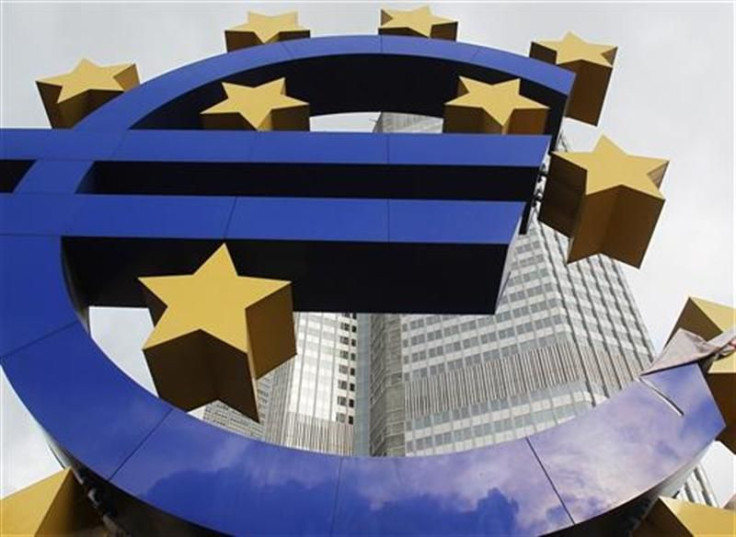Euro Rising on German Economic Data

(REUTERS) -- The euro rose to a session high and shares reversed early losses after key German data bolstered hopes that Europe's largest economy was recovering and a strong Italian bond sale added to signs that financing pressures were being contained.
Those factors revived sentiment after a raft of euro zone credit downgrades and warnings on the AAA ratings of France, Britain and Austria from Moody's, which hit European markets early on.
U.S. stock index futures pointed to Wall Street extending Monday's gains with U.S. retail sales data for January expected to support the growing confidence that growth in the world's top economy was improving.
Germany's ZEW Indicator of Economic Sentiment suggested the recovery, which slowed at the end of last year, is back on track there and that analysts are less fearful now about the impact of the euro zone's debt crisis on the growth outlook.
The economic weakness at the turn of the year is starting to look more and more like it was just a mere dent, said Rainer Sartoris, an analyst at HSBC Trinkaus. The economy is stabilizing.
Italy sold 6 billion euros ($7.9 billion) of new bonds due in November 2014. Yield fell to their lowest level since March 2011, adding to impressions that the risk aversion prompted by the Moody's downgrade announced late Monday was overdone.
All in all, a good auction for Italy, Annalisa Piazza, market economist at Newedge Strategy in London, said.
This is a sign that the government's efforts to make significant changes in the Italian economy are actually 'buying' confidence amongst investors.
The FTSEurofirst 300 index .FTEU3 gained about 0.2 percent to 1,074.16 points, having traded in the red early in the day, largely in response to the Moody's warnings and downgrades to Italy, Portugal, Spain, Slovakia, Slovenia and Malta.
The euro, which had fallen to a session low of $1.3127 on the Moody's announcement, rose to $1.3205 from around $1.3185 before the release of the ZEW survey and the Italian bond auction results.
^^^^^^^^^^^^^^^^^^^^^^^^^^^^^^^^^^^^^^^^^^^^^^^^^^^^^^^^^
German ZEW economic sentiment: link.reuters.com/cag54s
Euro zone credit ratings: r.reuters.com/pyh48r
Euro zone debt crisis in graphics (package): r.reuters.com/hyb65p
^^^^^^^^^^^^^^^^^^^^^^^^^^^^^^^^^^^^^^^^^^^^^^^^^^^^^^^^^
The broad MSCI All Country World Index .MIWD00000PUS was virtually flat at 326.26 after Asian shares earlier fell on the Moody's announcement and its warning over the UK, which has been seen as something of a safe haven for investors looking to diversify away from the euro zone.
Investors had also become uneasy about whether the European Union and the International Monetary Fund would judge as adequate new austerity measures approved by the Greek parliament, which are needed to release bailout funds and avoid a chaotic default.
German Bund futures traded near session lows at 137.99, down 23 ticks on the day.
BOJ SURPRISE
The dollar gained about 0.6 percent to a near three-week high of 78.19 yen and Tokyo stocks rose .n225 when Japan's central bank surprised markets with a further loosening of its monetary policy through an increase of its asset buying and lending scheme.
Although not expected so soon, the move tallies with easier stances adopted by other major developed-world central banks as they seek to support a modest global recovery and encourage investors to move into riskier assets like equities.
Cheap loans from the European Central Bank and the prospect of a lot more of this type of funding at the end of the month helped Italy sell its November 2014 paper at yields of 3.41 percent, compared with 4.83 percent in mid-January.
Fellow peripheral struggler Spain's short-term borrowing costs also fell Tuesday at a sale of 5.4 billion euros of 12- and 18-month bills.
In commodity markets, gold and oil prices were little changed after dipping early in line with broad weakness among riskier assets on the Moody's news and then recovering in line with the euro/dollar exchange rate.
Spot gold was at $1,720.10 an ounce against $1,722.49 late in New York Monday. U.S. gold futures for February delivery were down $2.90 at $1,722.00.
© Copyright Thomson Reuters 2024. All rights reserved.






















